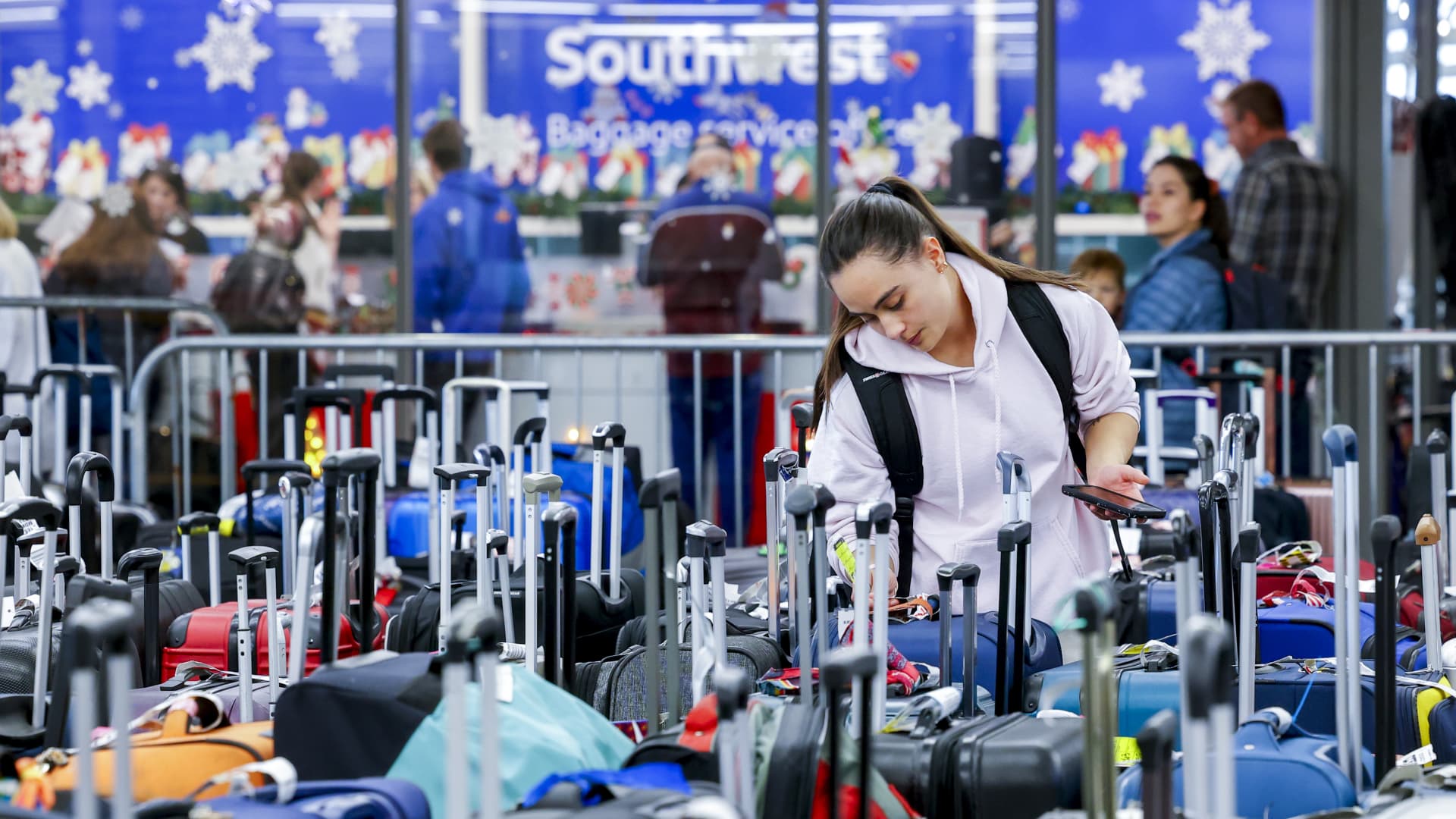Pristine Floyde searches for a friend’s suitcase in a baggage holding area for Southwest Airlines at Denver International Airport on December 28, 2022 in Denver, Colorado.
Michael Ciaglo | Getty Images
Southwest Airlines stabilized its schedule over the weekend after about 16,000 cancellations since late last month, but its systemwide holiday meltdown could cost it hundreds of millions of dollars.
Southwest had canceled 304 flights since Friday, 2% of its schedule, most of them on Monday when U.S. airlines faced bad weather and ground stops in Florida tied to a Federal Aviation Administration equipment outage. For comparison, from Dec. 21 through Dec. 29 Southwest had scrubbed about 45% of its operation, a far bigger share than other major airlines, according to FlightAware.
Now come two more difficult tasks for Southwest: going through thousands of passenger reimbursement receipts and improving the internal technology that contributed to the meltdown.
“We have plans to invest in tools and technology and processes, but there will be immediate work to understand what lessons are learned here and how we keep this from ever happening again, because it cannot happen again,” Southwest CEO Bob Jordan, who took the helm in February, told staff Friday.
Jordan said employees from other departments have volunteered to help customers and process refunds. The carrier is working with FedEx to help get customers their luggage.
“We’ve cut the number of bags in half since Thursday and we’re on track to get the majority if not all bags shipped to our Customers later this week,” Jordan told staff on Monday.
On Tuesday, Southwest told CNBC that it began offering travelers whose flights were canceled or significantly delayed between Dec. 24 and Jan. 2, and who didn’t travel or rebook, 25,000 Rapid Rewards points, a roughly $300 value, according to the airline. A day later, the airline told CNBC that travelers who rebooked with Southwest are also eligible for the 25,000 miles.
The miles required to redeem for a ticket vary depending on demand and capacity. Over Easter weekend, for example, it currently costs more than 25,000 Rapid Rewards points to travel roundtrip between Baltimore and Los Angeles, but it would more than cover a ticket a week later.
Bad weather kicked off the issues last month, impacting flights throughout the U.S. But Southwest crews struggled to get reassigned automatically after all of the changes and were forced to wait on hold for hours with crew scheduling services. Hundreds of thousands of passengers were impacted, and Southwest is still working through a backlog of misplaced luggage.
The carrier had canceled about two-thirds of its flights for much of the last week in an attempt to get crews and planes where they needed to go, before operating close to normally on Friday.
The chaos could cost Southwest between $600 million and $700 million, according to estimates from Bank of America airline stock analyst Andrew Didora on Tuesday. That includes both lost revenue from refunds and the reimbursements to affected passengers, which could include expenses like hotels and rental cars.
Didora cut his fourth-quarter adjusted earnings forecast for Southwest to 37 cents a share from 85 cents.
A Southwest executive last week said the cancellations will “certainly” hit its fourth-quarter results but that it will take weeks to work through customers’ reimbursement requests.
Transportation Secretary Pete Buttigieg vowed to hold Southwest accountable if it didn’t provide customers with refunds and reimbursements, though such fines associated with a failure to pay back customers can take months if not years.
Southwest shares fell 3.2% to $32.60 on Tuesday, a bigger drop than rivals. The Dallas-based airline is scheduled to report results on Jan. 26 but is likely to preview the meltdown’s costs before then.

